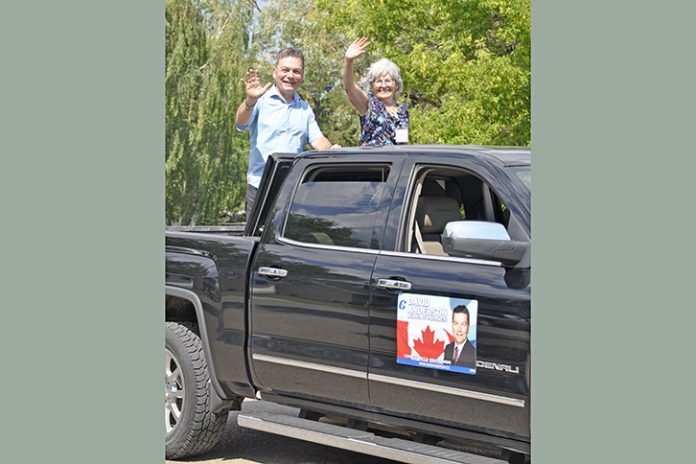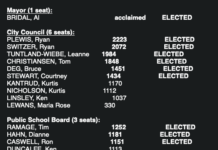
Long serving Cypress Hills Grasslands Member of Parliament David Anderson will not be seeking re-election this fall.
Anderson, who has served in Ottawa for 18 years and has sat as the representative for the Southwest in Ottawa since 2000, is stepping away from politics.
“Clearly we’ve been in this for a while. This will be 19 years by the time we’re done. We’ve had six elections. And when each of these elections come around you have a decision to make. Do we want to go one more time? Do we think we can make a really strong contribution or not?” Anderson said of the discussion he had with his wife Sheila when contemplating the future.
“The other issue for me is that at what point do we begin to try to spend a little bit more time with our families? Sheila and I have spent a lot of time apart over the last 18 years and we just feel it’s a good time for us to start working on some projects together and really trying to spend more time together.”
“Spouses pay a tremendous price for the work that we do and don’t always get any recognition for that. And so I want to make sure that that is recognized.”
First elected to Ottawa in 2000, Anderson sat for a record six terms as the Southwest representative in the House of Parliament. When he earned his sixth election win on October 19, 2015, he surpassed Jack McIntosh, Progressive Conservative, who was elected as MP on five occasions (1968, 1965, 1963, 1962, 1958).
The popular MP was elected by a 60 per cent or larger margin during each election, including a 69.85 per cent margin in 2011 and a 69.19 per cent spread in October 2015.
“I was probably blessed with a couple of minority governments. For about six years there it seemed like every time we turned around we were going back to an election. And we were on election readiness basically all the time. So you’re in Ottawa doing your work and you’ve got a minority government, you’re always thinking about when are we going to the next election. They were coming fast and furious for a while.”
“It was a real treat for us to get the majority government in 2011, and then really be able to buckle down for the four years and put our agenda in place. I think it was good for Canada. And certainly it left us in a good spot when we were done financially, fiscally, and in other areas.”
“The time goes by really quickly. It’s hard to believe 18 and a half years, 19 years, have already taken place.”
Anderson, 61, said the decision also takes into account his office personnel and support staff.
“But the other side of it also is the people that we work with are critically important to us in the way that we can do our work and the level of acceptance and support from the public.”
Representing such a large rural constituency required considerable travel to meet with constituents over the years.
“I think we’ve put on a few miles,” he said, noting he drove one truck with 500,000 kilometres, one truck with 300,000 kilometres, and is currently driving one with 150,000 kilometres. “It was easier as time went on because as you came into small towns and you knew people who owned the grocery stores, or the people working at the RM buildings or the town office. You ended up with a lot of people who are friends. You’re not just stopping in and talking to people that you don’t know. But these are people that I’ve met with numerous times and you really can see people as friends.”
Anderson reflected on his years as a Member of Parliament and said leaving politics will be a significant change.
“It’s not an easy decision to make. I’ve watched colleagues of mine who have left this position and it seems to be a difficult adjustment for people to do that, and I expect there’ll be some of that difficulty as well. But I think one of the things that will kind of alleviate that is knowing that a number of the things that I wanted to see done and things that I thought were important we’ve been able to do a good job on them. One of them would be the Canadian Wheat Board and the marketing freedom that we were able to bring. And I know that was a contentious issue at the time. But I think its been good for farmers and its been good for the western Canadian agriculture industry. And so I’m glad to have actually been able to be a part of that.”
“Some of the other work we’ve done over the last few years, particularly on the international religious freedom issue. I was part of a group that set up a network (International Panel of Parliamentarians for Freedom of Religion or Belief) that started in 2014, we now have over 300 members of parliament and legislatures around the world that are part of that. And they are working on this fundamental right of people to be able to actually believe what they want to believe and practice it.”
Anderson served in a variety of caucus roles over the years. He served as Parliamentary Secretary to 10 different cabinet ministers, including as Parliamentary Secretary in Agriculture as well as Natural Resources. In opposition he worked as critic of the Canadian Wheat Board and Associate Critic of Agriculture and Agri-Food. He is currently in the shadow cabinet as Secretary for Human Rights and Religious Freedom.
Anderson felt that he provided an effective voice in Ottawa over the years. However, he said the current dissatisfaction with Ottawa is more Western alienation than he has seen during his years in politics.
“I think so, and I think our government did a good job of that as well,” he said of his voice as a politician. “We didn’t see this kind of alienation across Canada that we’re seeing now. And I think it was partially because Stephen Harper was willing to let the provinces have their say, let them make their own decision. We weren’t driving wedges across the country. And certainly we’re seeing some of the results of a different approach to government right now. I fear for our country and I expect that in the fall the people are going to make a different choice. I think Andrew Scheer is going to be the new Prime Minister of Canada. I think he’ll do a good job and it will be good for the country to have him in that role.”
Anderson will be returning to Ottawa for the next three weeks of sitting days starting on March 18, where Parliament is dealing with some high profile issues.
“We’ve got some really interesting things taking place in Ottawa right now, obviously around SNC-Lavalin and the discussion about this government’s capacity to do its job. So I think you’ll probably see us continue to focus on that.”
“We don’t have a lot of weeks left in Parliament. I think they’re under 45 sitting days now. So the government has a lot of work to do if it wants to pass some of this legislation, including its new budget, and a limited amount of time to do that. So we’re going to try to hold their feet to the fire.”
“There’s a number of things they’ve threatened us with that we need to roll back if we can. C-69, the bill that would completely change the resource sector. Approval process is one of those things. The government’s been threatening to restrict firearm ownership for legal firearms owners. Those are the kinds of things that really get the attention of people in this riding, and I need to make sure that I continue to stand up for Southwestern Saskatchewan.”
And while Anderson will not be running in the October 21 federal election, he currently does not know where his future will take him.
“We don’t have anything that’s laid out specifically. I’d like to spend some time with my family. We’ve got some grand kids and little people in our lives that I’d certainly like to spend time with as well.”
He stressed that he is not retiring, but rather looking for new endeavours.
“There’s lots of things out there to do, and not enough time to do them all. So we’re certainly looking forward to the future. We’ll just see where it goes.”
“Most people would know that I’m a Christian. I think that God can give us direction in our lives, and we’re going to wait and see if we can find out what that direction is and then try to follow it.”





